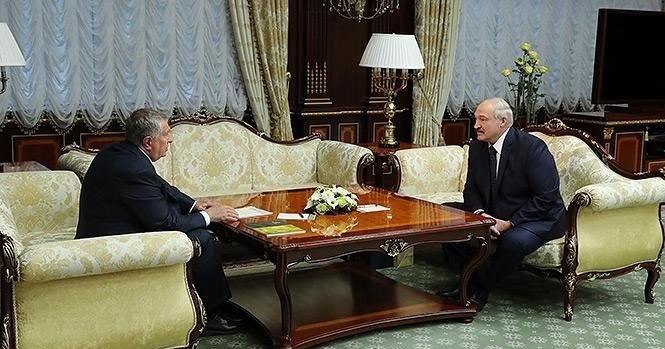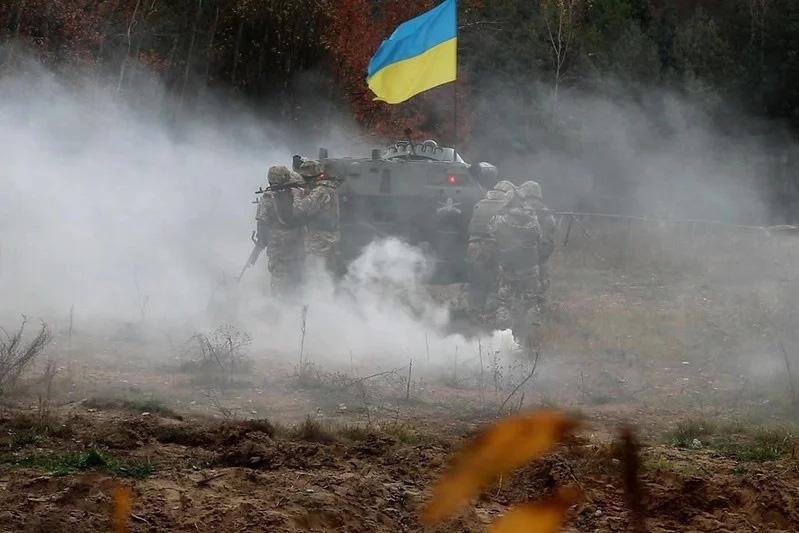
10 minute read
PUTIN “SUPREME LEADER”? SLOWDOWN IN RUSSIA’S
17 February 2020
SOURCE: WINTERSHALLDEA.RU
Advertisement
GERMAN-RUSSIAN COMPANY SIGNS AGREEMENT ON ENERGY PROJECT IN EGYPT
On the occasion of the recent security conference in Munich and Sergey Lavrov’s visit to Germany, a meeting has been held between the head of Russian diplomacy and his German counterpart. Sergey Lavrov and Heiko Maas have also attended a working breakfast with representatives of German business. This further emphasises the increasingly closer economic cooperation between Russia and Germany. The most evident manifestation of it is the construction of the Nord Stream 2 gas pipeline. However, it also needs to be highlighted that there are other German-Russian projects in the field of energy that are underway. W hile the international security conference was being held in Munich, the EGYPS-2020 international oil and gas conference was taking place in Cairo. During this event, the Egyptian authorities concluded an agreement on gas and oil cooperation with Wintershall DEA. This German-Russian company has signed its first contract in Egypt. The deal concerns the exploration and exploitation of oil and gas deposits in the Nile Delta. The agreement between Wintershall DEA and the Egyptian Natural Gas Holding Company (EGAS) provides for the development of an area in the eastern part of Damanhur in the Beheira province. The minimum value of the investment is to be $43 million. An agreement on the merger between the German company Wintershall and the Russian company DEA was signed in September 2018 by the heads of BASF (Wintershall is its subsidiary) and the Russian oligarch Mikhail Fridman, the owner of LetterOne (DEA is its subsidiary). Initially, BASF received 67% of shares in Wintershall DEA, while LetterOne
acquired 33% of shares. Over the next few years, the German shares are to increase to 72.7%. In spring 2019, the European Commission approved the merger. At present, Wintershall DEA has 128 licenses in eight countries all over the world. DEA had once been a German company, however, LetterOne bought it in 2015 (BASF was also among the contenders for the purchase of DEA). In October 2017, DEA, already owned by Fridman, took over the Norwegian branch of the German company E.ON. Wintershall has long been cooperating closely with another Russian entity – it has shares in projects carried out jointly with Gazprom. The largest one concerns the exploitation of the Urengoy gas field (Gazprom 50%, Wintershall 50%). Wintershall is also Gazprom’s partner in the construction of Nord Stream 2.
RUSSIA’S SECHIN ARRIVES IN MINSK: “WE NEED TO CONTINUE TO COOPERATE” 18 February 2020
The Belarusian-Russian dispute over the terms of oil supplies has not ended in Sochi on February 7. The threats made by Alexander Lukashenko that Belarus will begin to take oil from Russia’s transit pipeline and look for alternative sources of oil supplies have done the trick. The head of Russia’s largest oil company, who also happens to be one of the most influential politicians in Moscow, arrived in Minsk. It seems that, during the talks in Minsk, Igor Sechin represented not only his own company, but also the entire country of Russia and its oil interests in Belarus. It should be noted that he is definitely much more than just the head of Rosneft. For years, Sechin has played an important role in Russia’s foreign policy, in particular, in places where oil is of major importance, for example, in Venezuela.
On February 18, the President of Belarus met with the head of Rosneft, the largest Russian oil company. The talks with Igor Sechin concerned the issue of energy cooperation between Belarus and Russia. Since the beginning of this year, Russia has reduced oil supplies to a minimum to its western neighbour. The parties cannot agree on the price of oil. Since January 1, 2020, no agreement on oil supplies to Minsk has been signed. Two Belarusian oil refineries, one in Novopolotsk and the other in Mozyr, are operating at minimum capacity due to the shortage of the required amount of oil. Minor Russian companies provide small oil supplies to Belarus, allowing the refineries to operate at minimum capacity. The Belarusian authorities are looking for alternative oil sources and supply routes. The recent meeting between Presidents Lukashenko and Putin on February 7 in Sochi has confirmed the change in the terms of cooperation – because Minsk does not agree to deepen integration with Russia (de facto deepening political dependence on Moscow), the Kremlin announced that Belarus will have to purchase oil on commercial terms and deal individually with Russian suppliers. Until recently, Rosneft has been the largest oil supplier to Belarus. In 2019, Sechin’s company supplied about half of the oil purchased by Minsk in Russia. However, Sechin’s meeting with Lukashenko should not be considered only in this context.
Taking into account the role played by the head of Rosneft in Russia, it seems rather that Sechin was given the task of solving the “Belarusian problem”. It is possible that a new model of Russian oil supplies to Belarus will finally be established, however, it would have to be more favourable to Minsk than the usual market terms. “I hope, taking advantage of the fact that we have known each other for a long time, you will think of something and we will be able to agree on further cooperation,” Lukashenko said, to which Sechin replied: “We need to continue to cooperate, of course. We are ready
SOURCE: PRESIDENT.GOV.BY

for constructive cooperation”. And by that he did not only mean his own company, but rather the entire Russian side, in general. Sechin arrived in Minsk a few days after Lukashenko had publicly announced that Russia suggested that Belarus and Russia be a unified state in exchange for favourable oil and gas prices, and threatened that if Belarus does not receive 2 million tonnes of oil agreed by the two governments in February, it will start taking it from the Druzhba export pipeline, which transports oil to the West through Belarus.
ATTACK IN DONBASS, CONFERENCE IN MUNICH: BAD SIGNALS FOR UKRAINE 18 February 2020
First, the 2020 Munich Security Conference brought no positive results for Kyiv, and then, soon after that, pro-Russian rebels launched an attack in the Donbass. Simply put, this is Russia’s way of demonstrating that the peace process resumed in autumn 2019 has been frozen again and will remain so for a long time. This is a problem for Volodymyr Zelensky, who has made reaching a peace agreement on the Donbass and putting an end to the actual armed conflict one of the most important points of his presidency. The recent events also confirm that the international situation – in particular, regarding the conflict in the Donbass and relations between Western Europe and Russia – is now changing, unfortunately, to the detriment of Ukraine.
On February 18, at about 5 o’clock in the morning, pro-Russian separatists attacked Ukrainian positions in the Luhansk Oblast, near the villages of Novotoshkovske, Orikhove, Krymske and Khutor Vilny. They opened fire, using weapons banned by the Minsk Agreements, including 120-millimetre calibre mortars, grenade launchers and heavy machine guns. Under artillery fire, the rebels tried to break through the front line at the meeting point of the positions held by two Ukrainian brigades. After five hours of fighting – the heaviest since the beginning of Zelensky’s presidency – the rebels asked for a ceasefire. The gunfire stopped, the situation is stable, the Ukrainians have held their positions. Chief of the General Staff of the Armed Forces of Ukraine Ruslan Khomchak reported that one Ukrainian soldier was killed, three were wounded and two injured. The rebels lost four men, six people were wounded. “This is an attempt to disrupt the peace process,” President Volodymyr Zelensky said. At an emergency meeting of the National Security and Defence Council, Zelensky assured that the attack of the pro-Russian rebels would not change Ukraine’s course towards ending the war.
SOURCE: FLICKR.COM

The attack was conducted on the fifth anniversary of the victory of pro-Russian forces in the battle of Debaltseve. It should be noted that the escalation of hostilities in the Donbass occurred the day after Russia’s Minister of Foreign Affairs Sergey Lavrov, when asked about the possibility of holding a summit of the Normandy Four in April, had said in Munich that the timing of the meeting should be understood only as the wishes of Russia’s partners in this format. He emphasised that Russia has not yet seen any progress as regards the implementation of the provisions of the previous summit of the Normandy Four in December 2019 in Paris. Lavrov said that this is Kyiv’s fault. This means that the Kremlin has adopted even a more rigid stance after the renewal of the peace negotiations last year. During the Munich conference, both President of Ukraine Volodymyr Zelensky and President of France Emmanuel Macron expressed hope that another summit of the Normandy format will be held in April. At the very same conference, an incident occurred, illustrating Western Europe’s shifting attitude towards Russia. A document containing proposals for resolving the Ukrainian-Russian conflict prepared by the Euro-Atlantic Se-
curity Leadership Group, a non-governmental organisation, was published on the website of the 56th Munich Security Conference. Some of the statements presented there echo the Kremlin’s standpoint. The document was removed from the website due to the criticism expressed by Kyiv as well as other expert centres. Both its publication and recommendations, such as, for example, a partial easing of sanctions in exchange for the gradual implementation of the Minsk Agreements, are in line with the idea of resetting relations with Russia, which have worsened since the annexation of Crimea in 2014, that is being pushed through by some Western European politicians, including Macron and certain German elites.
RUSSIA’S ROSNEFT HITS RECORD-HIGH PROFITS AND PAYS OUT BIGGEST-EVER DIVIDENDS 19 February 2020
Throughout 2019, Russia’s state oil firm Rosneft earned 805 billion roubles ($12.6 billion), up from 649 billion roubles ($10.2 billion) in 2018. With increasing profits come record-high dividends to be paid out to the firm’s shareholders, including the state. R osneft’s revenues were 8.68 billion roubles in 2019, or 5.3 percent more than a year before. An increase in the oil firm’s earnings stemmed from the 20.1 percent surge in oil output, with a 6.2-percent drop in its prices globally. The EBITDA ratio went up by 1.2 percent, reaching 2.1 trillion roubles, while the firm’s clean debt dropped by 907 billion roubles, or 15.6 percent. The recent increase in ratios is linked to Rosneft’s bigger oil sales, “chiefly in the east,” and its improved expenditure control. In addition comes Rosneft’s capital expenditure that dropped by 8.8 percent. In 2019, the company’s net profit attributable to shareholders soared by 29 percent. As announced by Igor Sechin, CEO of Rosneft, revenues from dividends calculated according to the 2019 average share price will amount to 8 percent. Throughout 2019, the company paid out 283 billion roubles in dividends to its shareholders, of which payout to the state totalled 141 billion roubles ($2.2 billion). The firm paid out 162.6 billion roubles – or 5.2 percent more than a year before – in dividends to shareholders in the first half of 2019. Suffice it to recall that Rosneft’s total dividend amount hit a record 274.5 billion roubles in 2018. In late 2017, in its updated dividend policy, Rosneft agreed to pay 50 percent of its net profit as dividends to shareholders. With Rosneft’s figures in the second half of 2019, shareholders could fetch up to 191 billion roubles, an amount that is likely to exceed 350 billion roubles throughout the whole year. Rosneft will pay half of this sum to its state-run shareholder, Rosneftgaz, that holds 50 percent plus one voting share. Russia’s biggest and well-performing oil firm is now hoping to leave its footprint on foreign energy markets. Rosneft is keen to bid for India’s oil marketing and refining firm Bharat Petroleum Corp Ltd (BPCL) that owns 25 percent of the country’s fuel stations. Energy firms










